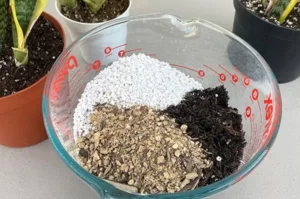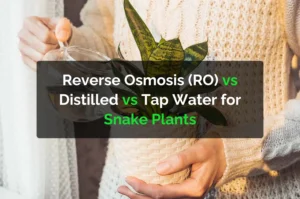Snake plants are popular for their tough nature and striking looks, but if you want them to thrive, the kind of water you use can make a surprising difference. Among all the watering options, many plant lovers are now turning to rainwater. But is it really good for snake plants?
In this article, we’ll explore the benefits (and a few cautions) of using rainwater for your snake plant, how it compares to tap water, and some practical tips for collecting and using it.
Why Water Quality Matters for Snake Plants
Snake plants (Sansevieria) are low-maintenance, but they still need the right care to grow healthy. One often-overlooked part of plant care is the type of water used. Tap water, depending on where you live, can contain chlorine, fluoride, and mineral salts, which may build up in the soil over time and affect plant health.
The Benefits of Rainwater for Snake Plants
1. Naturally Soft and Chemical-Free
Rainwater is considered “soft” water. This means it doesn’t have the added minerals and chemicals (like calcium, magnesium, and chlorine) that tap water often contains. These chemicals can build up in the soil and interfere with nutrient absorption in your snake plant’s roots.
2. Better Soil Health
Over time, hard water from taps can leave behind mineral residues in the soil. This buildup affects the pH level and can harm your plant’s root system. Rainwater helps flush out these salts and keeps the soil more balanced.
3. Environmentally Friendly
Using rainwater for your plants helps conserve treated tap water. It’s a sustainable and eco-friendly choice, especially if you’re growing multiple houseplants or running a garden.
4. Free and Easy to Collect
Rainwater costs nothing. With just a bucket, barrel, or a simple collection system, you can gather enough water to keep your snake plant hydrated for weeks.
How to Collect and Store Rainwater Safely
Collecting rainwater is simple, but keeping it clean is important.
Tips for Collecting Rainwater:
- Place clean buckets or containers outside during rainfall.
- Use a rain barrel attached to a downspout for larger amounts.
- Make sure the container is clean and made of food-safe material.
Storage Tips:
- Store rainwater in a dark, cool place to prevent algae growth.
- Keep containers sealed to avoid mosquito breeding.
- Use the water within 1–2 weeks if possible.
Can Rainwater Ever Be Harmful?
While rainwater is usually excellent for plants, there are a few situations to watch out for:
1. Pollution in Urban Areas
In highly polluted cities, rainwater can carry harmful chemicals from the air. This is especially true during the first few minutes of rainfall, known as “first flush.” It’s best to let this initial rain run off before collecting.
2. Contaminated Collection Surfaces
Avoid collecting rainwater from dirty rooftops or gutters, which may contain bird droppings or debris that can contaminate the water.
Tap Water vs. Rainwater: Which Is Better?
| Feature | Tap Water | Rainwater |
| Chlorine & Fluoride | Often present | Absent |
| Mineral Content | High in some areas | Naturally low |
| Cost | Adds to utility bills | Free |
| Soil Impact | Can cause salt buildup | Helps flush salts |
| Plant Preference | May cause leaf browning | Encourages healthy growth |
Verdict: Rainwater wins, especially if your tap water is hard or heavily treated.
How Often Should You Water Snake Plants with Rainwater?
Snake plants don’t need frequent watering. Using rainwater doesn’t change this. Follow these tips:
- Spring/Summer: Water every 2–3 weeks or when the soil is dry.
- Fall/Winter: Water less frequently, about once a month.
Always check the soil before watering. Snake plants are prone to root rot if overwatered, no matter how pure the water is.
Frequently Asked Questions (FAQs)
Can I use rainwater for all my indoor plants?
Yes! Rainwater is great for most indoor plants, not just snake plants. It’s especially helpful for plants sensitive to salts or chemicals.
Is bottled water better than rainwater?
Bottled water is often purified and safe, but rainwater is more natural and cost-effective. Unless rainwater is unavailable or unsafe, it’s a better long-term choice.
Can I mix rainwater and tap water?
Yes, mixing is fine if you’re running low on rainwater. It can still help dilute the effects of tap water.
Conclusion:
Absolutely! Rainwater is a natural, chemical-free source of hydration that your snake plant will love. It helps avoid harmful salt and chemical buildup in the soil, encourages healthy growth, and reduces your environmental footprint.
As long as it’s collected and stored properly, rainwater is one of the best watering choices for your snake plant. So next time it rains, grab a bucket—your Sansevieria will thank you!






